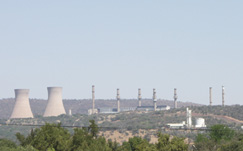South Africa leads the way at Safari-1
23 March 2015
South Africa quietly marked a world-leading milestone last week: the 50th
anniversary of its Safari-1 Research Reactor was celebrated on 18 March.
More importantly, it is the only country in the world to have produced weapons-
grade uranium and then voluntarily dismantled its weapons programme to turn its
resources towards medical research. South Africa
abandoned development of weapons of mass destruction in 1993 as it took its first
tentative steps towards its first democratic election.
Safari (South Africa Fundamental Atomic Research Installation) is a 20 Megawatt
tank-in-pool type nuclear research reactor, owned and operated by at the South
African Nuclear Energy Corporation (Necsa) in Pelindaba, outside Pretoria. It
provides products and services both locally and internationally to various industrial
and institutional sectors. It is South Africa's only nuclear research reactor.
"This child was born when there
was no peace – 1965, I was doing my second year
in Robben Island. So this baby that we are celebrating was born when this country
was in a very serious situation. We are celebrating today when the country is at
peace with itself," President Jacob Zuma said at the anniversary dinner.
"More than 20 years ago our country made a determination to use nuclear
technology only for peaceful purposes. Safari has been instrumental in this regard,
leading to the creation of many products with have a positive impact in the daily
lives of people around the world."
Saving lives
Voice of America news reported that nuclear medicine produced at the Pelindaba
research site – generated by the Safari-1 – was used in about 10 million medical
procedures in more than 60 countries every year, saving millions of lives.
Through Safari, South Africa contributed to major scientific innovation, Zuma said.
Products coming out of its work ranged from those used
in nuclear medicine to
industry.
"Today we are among the leaders in the production of isotopes that are used in
nuclear medicine," he said. "These are also used in the diagnosis and treatment of
critical diseases such as cancer. From Pelindaba we have a proud record of
exporting these on time to more than 60 countries.
"Therefore the work done here at Pelindaba directly saves the lives of people in all
continents."
Safari was also central to industrial development as some of its outputs were used
in a range of other sectors for materials testing.
"Safari has also allowed us to collaborate with international institutions such as the
International Atomic Energy Agency [IAEA] and other countries as we seek
advanced solutions to some of the problems facing the world."
Nuclear safety
In another notable achievement, the Safari reactor was among the most used in the
world, operating for more hours per year compared to
others. This was testament
to South Africa's ability to operate nuclear facilities with high standards of safety.
The expertise and knowledge at Pelindaba will be used in the country's nuclear new
build programme to ensure energy security. The Department of Energy and Necsa
have also signed training agreements with China, Republic of Korea, Russian
Federation and France to be ready to meet the demand of the nuclear new build
programme. Some 300 young South Africans will receive specialised nuclear skills
training from international partners this year.
Medical isotopes
Since it's commissioning on 18 March 1965, Safari-1 has achieved many outstanding
successes, according to Necsa, and it is undertaking a number of activities that are
beneficial to mankind.
In 1998, it received the ISO 9001 certificate for compliance to international quality
standards – the second nuclear reactor in the world to receive this award.
It is the
main supplier of medical isotopes in Africa. "Some of the most spectacular
advances in medicine in recent years have been in the fields of imaging and
scanning using selective medical isotopes," explains Necsa. Isotopes are used in
various chemical forms in many studies, such as imaging of the heart, brain,
thyroid, liver, lungs, kidneys and bone.
Necsa is Africa's largest producer of a range of medical isotopes used for diagnostic
purposes and for cancer treatment. Millions of people have received the benefits of
medical isotopes originating from Safari-1.
It is also the leading producer of Molyndenum-99, the radioisotope used extensively
as a raw material for technetium-99m, the most important diagnostic nuclear
medicine isotope. "Since 1993, with its unique ability to manage virtually the entire
nuclear production cycle, Necsa has become the sole local… and one of the four
largest producers of the isotopes in the world."
SAinfo
reporter
 Pelindaba Nuclear Research Centre, west of Pretoria. (Image: Wikimedia Commons: NJR ZA)
Pelindaba Nuclear Research Centre, west of Pretoria. (Image: Wikimedia Commons: NJR ZA)




